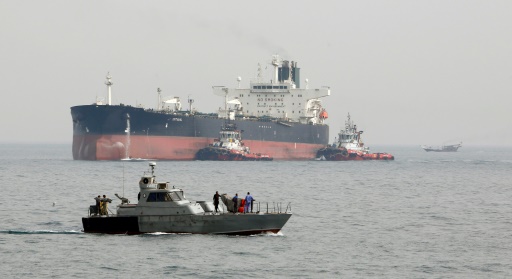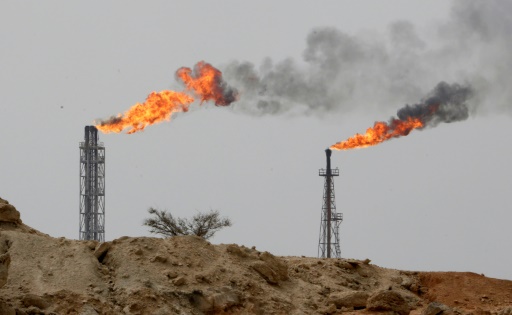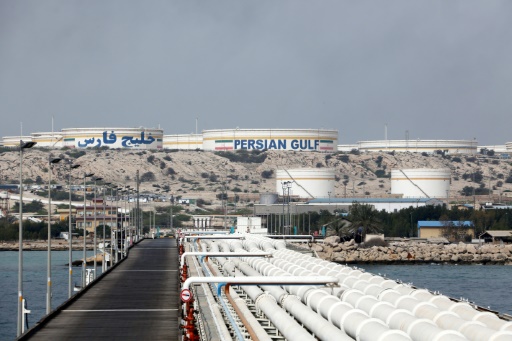Tehran (AFP) – Iran faces a potentially crushing loss of oil exports when US sanctions return in November, but the impact could be blunted by its experience of working around embargoes.
When Iran faced its toughest international sanctions between 2012 and 2015, analysts say it found a number of creative solutions, from repainting and renaming ships to switching off their tracking devices.
Those tactics have continued.
“We find those tankers quite often, leaving and entering Iran in a covert fashion with their transponder turned off,” said Samir Madani, co-founder of TankerTrackers.com, which monitors the oil trade.

AFP/File / ATTA KENARE. An Iranian military speedboat patrols as a tanker prepares to dock at an oil facility at Khark Island, March 12, 2017.
“We spot them through satellites. I’d say several vessels a month,” he told AFP.
Analysts expect such behaviour to ramp up when US sanctions on Iran’s oil industry return on November 5, following Washington’s withdrawal from the nuclear deal in May.
US pressure has already caused a 24 percent drop in Iran’s sales between May and August, according to Bloomberg.
The big surprise has been cuts by Asian buyers, which analysts expected to resist US pressure, notably a 35 percent drop by China and 49 percent by India, according to the Eurasia Group consultancy.
“We underestimated the degree to which New Delhi and Beijing would concede to Washington’s demands,” it said in a briefing note.
Eurasia Group said wider geopolitics are at play: India is looking to deepen strategic ties with the US, while China may wish to avoid a fresh spat when it is already embroiled in a bitter trade dispute with Washington.
Iran was exporting 2.7 million barrels of oil per day in May, but that has already fallen to 2.1 million.
Overall, Eurasia Group predicts the country’s sales will fall by a further 0.9 million barrels per day to 1.2 million by November.
That would mean a loss of some $2-2.5 billion (1.7-2.1 billion euros) a month, at current prices.
– ‘Cat and mouse’ –
But analysts say Washington’s goal of reducing Iran’s oil sales to zero is unrealistic.
Iran has the world’s fourth-largest reserves, and many countries — particularly in Asia — rely on its supplies and have refineries designed for its particular flavour of heavy crude.
And Tehran has many tried and tested ways to keep oil flowing.
It has already increased price discounts since May, worth around $10-15 million a month to large importers like China and India compared with last year, said Wood Mackenzie, a consultancy.
“Buyers can pay in kind, trade in other currencies, or extend credit — even keep the money in an escrow account in Switzerland and wait until these sanctions are over. India had a deal like that last time,” said Madani.
If Iran can get its oil to a friendly port, it could be blended with oil from elsewhere and resold, said Thijs Van de Graaf, assistant professor for international politics at the University of Ghent.
“Iran played a cat and mouse game last time… and will probably do so again,” he told AFP.
It also has more aggressive options, with President Hassan Rouhani recently restating an old threat to block the vital Strait of Hormuz through which around a third of the world’s seaborne oil passes every day.
Rouhani announced last week that Iran was moving its main oil terminal out of the Gulf to a port in the Oman Sea, so that its tankers would no longer need to pass through the strait, giving it more scope to disrupt supplies.
– Pressure on Europe –
Iran says it will not accept major drops in its oil sales, putting pressure particularly on Europe, which was buying more than a fifth of its oil, to resist US demands.
The EU strongly opposed Washington’s decision to scrap the nuclear deal and has vowed to introduce a package of measures to protect trade with Iran.
But European firms are highly vulnerable to US sanctions.
Shipping, banking and insurance firms have already backed out of Iran and oil purchases are down by 35 percent.

AFP/File / ATTA KENARE. An oil facility at the Iranian island of Khark, March 12, 2017.
“If we cannot continue (the previous) level of sales even after the European package has been implemented, then that is a red line for us,” warned deputy foreign minister Abbas Araghchi on state television.
Supreme leader Ayatollah Ali Khamenei warned recently that Iran would “set aside” the nuclear deal if it was no longer receiving the economic benefits it promised.
One slight upside for Iran is that oil prices are already rising due to the squeeze caused by the looming US sanctions.
Some analysts predict prices could exceed $100 per barrel, from the current level of around $70.
The United States has pressured its ally Saudi Arabia to pump more oil to compensate for the loss of Iranian supplies.
“In theory, it is perfectly possible to have an increased price of oil that entirely compensates for the loss of exports. That’s why the US-Saudi relationship is key here,” said Van der Graaf.
Featured Photo: AFP/File / ATTA KENARE. An oil facility on the Iranian island of Khark, March 12, 2017.



 © 2026 All Rights Reserved
© 2026 All Rights Reserved